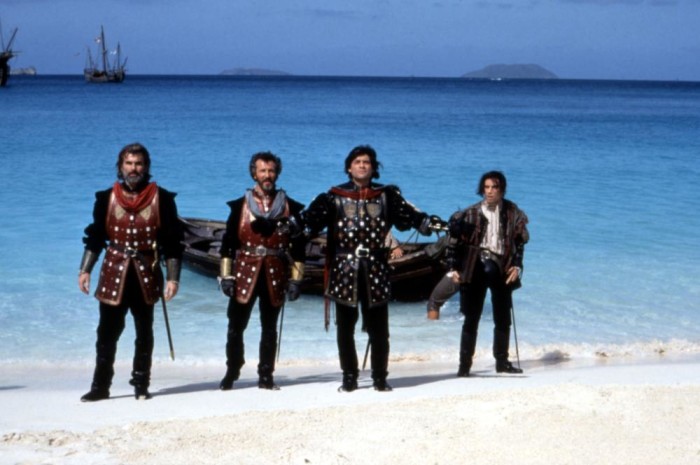Seeing Double: 'Christopher Columbus: The Discovery' Vs '1492: Conquest Of Paradise' On Their 25th Anniversary
(Welcome to Seeing Double, a series where two strangely similar films released around the same time are put head-to-head. This time: 1992's Christopher Columbus: The Discovery and 1492: Conquest of Paradise.)
Hollywood is a land of mystery. Who killed the Black Dahlia? Was Marisa Tomei the real winner of 1993's Best Supporting Actress Oscar? Are TV shows just really long movies?
One of the less salacious and controversial mysteries to come out of Hollywood though involves the occasional appearance of "movie doubles" – films from rival studios with highly similar plots/subjects that are released in close proximity to each other. Think Volcano and Dante's Peak or Deep Impact and Armageddon. There's little upside to both studios sticking to their guns and moving forward with the production as history shows that, more often than not, one of the pair falls by the wayside at the box-office, so why even head into production on a film you know another studio has already begun? Are original ideas that hard to come by in Hollywood? (This is a rhetorical question.)
This year is the 25th anniversary of both Christopher Columbus: The Discovery and 1492: Conquest of Paradise, two films released in 1992 to coincide with the 500th anniversary of the famed adventurer's voyage and "discovery" of America. Comparing the films reveals the expected similarities, but they still have their individual pros and cons. You're probably already feeling pretty confident in thinking which of the two came out on top – because odds are many of you don't even remember the other one – but that memory might be somewhat deceiving.
The Story
It shouldn't come as a surprise, but both films tell pretty much the same story. Christopher Columbus petitions the king and queen of Spain to fund his expedition to what he sees as a new world filled with riches and exotic treasures, but while he finds new lands to plunder it comes at a cost. There are still some differences, though.
Christopher Columbus: The Discovery (just Discovery hereafter) follows its title character to the New World, but it spends a substantial part of its two hour run-time focused on Columbus' efforts to secure financial backing from royalty, a teased relationship between him and the queen, and some torturous interactions with the legendary pain manager, Tomas de Torquemada. Another 30 minutes is spent on the ocean as Columbus clashes repeatedly with his ragtag crew, and it's only in the third act that we reach and spend some time amid the lush landscapes, curious natives, and moral ambiguity of our title character.1492: Conquest of Paradise, by contrast, is most interested in the journey itself as well as the events in the Americas that followed. Time is spent back in Europe, but while the film runs more than thirty minutes longer than its competitor, it feels in more of a hurry to head to sea and reach the New World. The meat of its story is in Columbus' relationship with the native people and the Europeans holding the purse strings. His goal of spreading Christianity, almost exclusively to the detriment of the locals, becomes his driving force, and the film ultimately offers a less forgiving look at the man than Discovery does.Advantage: A tie seems like the only option here. Both tell the same mostly familiar story, but both add a bit more detail on opposing ends with Discovery exploring Columbus' pre-journey life and 1492 giving more time to what follows.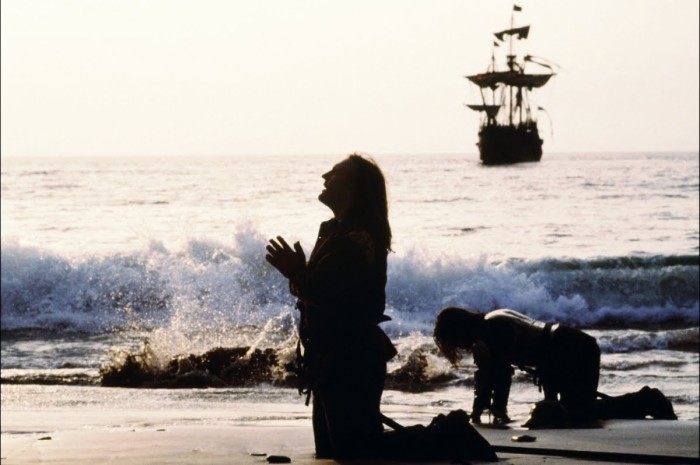
Filmmakers
Discovery came to the screen with a five-time veteran of the James Bond franchise in the director's chair. But while John Glen (Octopussy, License to Kill) helmed the film, it was known mostly as an Alexander Salkind production. Salkind produced, along with his son Ilya, and was a veteran of big family entertainment like The Three Musketeers, Superman, and Santa Claus: The Movie, but their cache maxed out during production, leading to massive budget cutbacks, work stoppage as actors waited on paychecks, and ultimately Salkind Sr.'s retirement from the industry. (His son would go on to sue him for breach of contract and more.) A competent but unspectacular director and a crumbling production house didn't exactly inspire much confidence, but they also had Mario Puzo (The Godfather) as a co-writer alongside John Briley (Gandhi, Cry Freedom) and Cary Bates (an episode of the animated TV series Jem) which seems like the epitome of a mixed bag.1492 had the greater fortune of landing Ridley Scott as director – after the Salkinds had tried wooing him to direct their own Columbus film – and he came to the project riding high on the success of Thelma & Louise and Black Rain (which it may surprise you to learn was his first film to crack $100 million worldwide after Alien ten years earlier). The film was written by Rose Bosch, an acclaimed journalist making her film debut, and bestselling instrumentalist Vangelis composed the score (although the trailers still went with Enigma's chant-happy hit "The Principles of Lust").Advantage: 1492 takes this one both at the time and in hindsight. Scott's production still had its troubles, but he ran a much tighter ship in addition to delivering the more accomplished-looking film.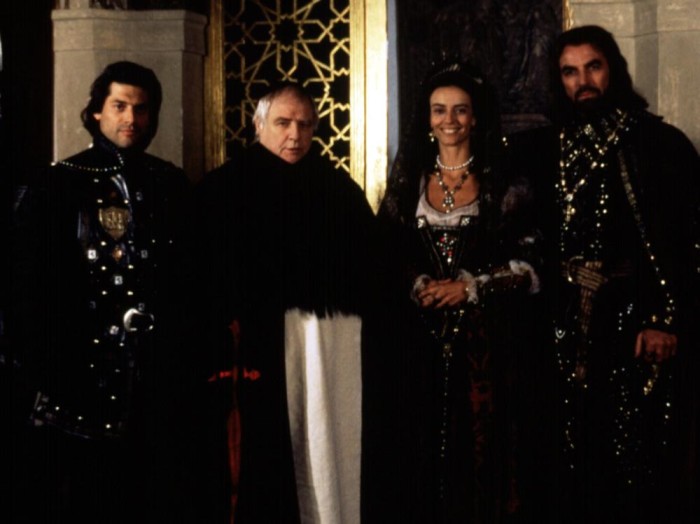
Cast
Timothy Dalton was originally cast as Discovery's Columbus with George Pan Cosmatos (Cobra, Tombstone) directing, but when the Salkinds replaced Cosmatos with Glen – the director of both of Dalton's James Bond outings – Dalton quit the production. That apparent bad blood led to the hiring of French actor George Corraface for the title role, and despite adding 80 more film credits to his resume since 1992, it's doubtful he's become any more recognizable to American audiences than he was then. The familiar faces were instead stacked in supporting roles with Marlon Brando, Tom Selleck, Rachel Ward, Robert Davi, and Benicio Del Toro all making appearances. It sounds good in theory, but in addition to eating up a multi-million dollar portion of the budget, Brando also sleepwalks through the role. Selleck's performance would go on to win a Golden Raspberry Award for Worst Supporting Actor.
1492 managed a much higher profile actor for its Columbus, but while Gerard Depardieu is more recognizable, he wasn't the best English speaker, resulting in lots of mumbling and short dialogue exchanges. The supporting cast is once again where the action's at, with the likes of Armand Assante, Sigourney Weaver, Michael Wincott, Frank Langella, Tcheky Karyo, and others gracing the screen.Advantage: If all you knew about these two films were their respective cast lists you'd be hard-pressed to take one over the other, but when you take performances and screen time into consideration, 1492 wins the category.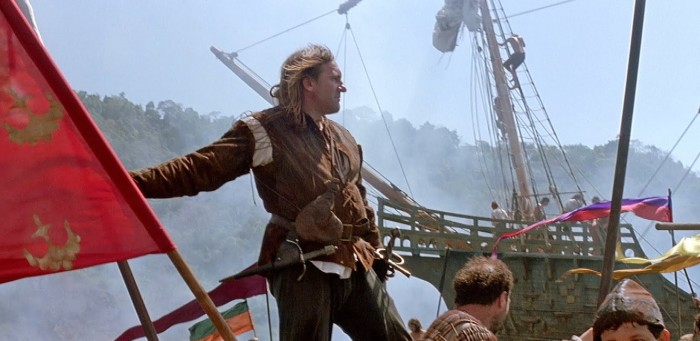
Critical Reception
Rotten Tomatoes wasn't around back in 1992, but the reviews that have been collected since have Discovery at a less than whopping 7% fresh with a 17% from audiences. Critics of the time were not kind to the film, with the general feeling being that it's surprisingly flat for a film about a character hoping to prove the world round. Owen Gleiberman called it "limp and exhausted, a bloodless swashbuckler," and Peter Rainer says "It's not politically correct. It's also not cinematically correct, humanly correct or historically correct."
1492 fares slightly better with a 39% RT score and a 51% from audiences. Critics still called out many of its narrative issues, but there's something of an agreement when it comes to the film's visual flair and beauty. "Over-ambitious but still utterly beautiful," says Clint Morris while Alex Sandell says it "misses the mark by an entire continent."Advantage: Fittingly for a numbers game, 1492 takes it in a very unimpressive race.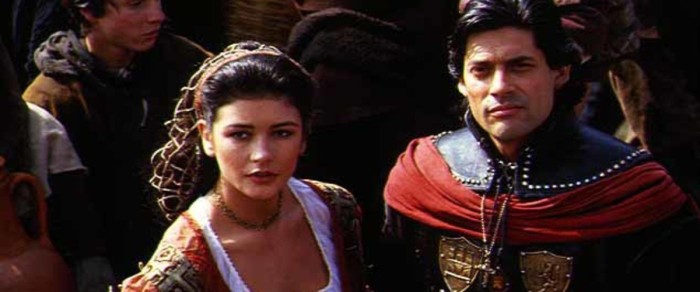
Budget and Box-Office
My guess would be that most people remember Scott's film while having little to no recognition for Glen's, but there's a good chance that's due entirely to the directors' opposing careers more than anything else – Scott is still a well-known filmmaker while Glen is not. I say that because both films are very similar in regard to budget and box-office. Discovery cost roughly $40m – although Glen disputes that saying it actually ended up much lower – while 1492 was reportedly budgeted at $47m. Regardless of the ultimate truths, there though their box-office fates were near identical. Discovery earned $8.3m while 1492 pulled in $7.2m. In a year featuring 235 theatrical releases, they sit a mere four spots apart from each other on the annual box-office chart.
Advantage: It appears audiences were the big winners here by staying home, but between the two films, it's pretty much a dead (in the water) heat.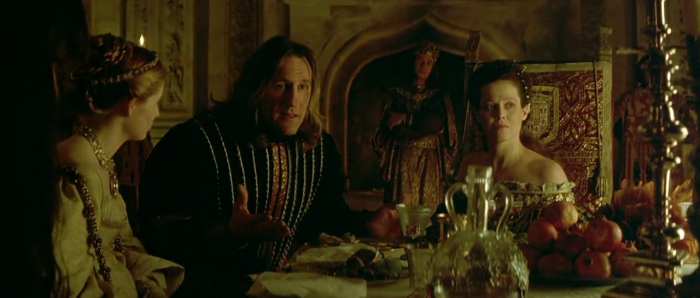
My Take
I'm someone who sported a "Columbus didn't discover America, he invaded it!" t-shirt as a pre-teen (thanks mom!), so I won't pretend to be an advocate for one film or the other. However, I don't get the impression anyone else really is, either. Neither has held much of a grip on film-lovers over the years, with Scott's film typically receiving ink only as part of general discussions about the man's filmography. Glen's entry doesn't manage the same, and worse, Discovery never even saw a home video release in the U.S. beyond VHS and Laserdisc.
If I had to choose one to watch now, 1492 would be the way to go. Yes it's longer, but it feels far more like a grandly attractive adventure compared to the dull flow of the other. Of course, you could skip both and just watch the animated The Magic Voyage instead which tells the story of Christopher Columbus with, uh, slightly less concern for historical accuracy.

